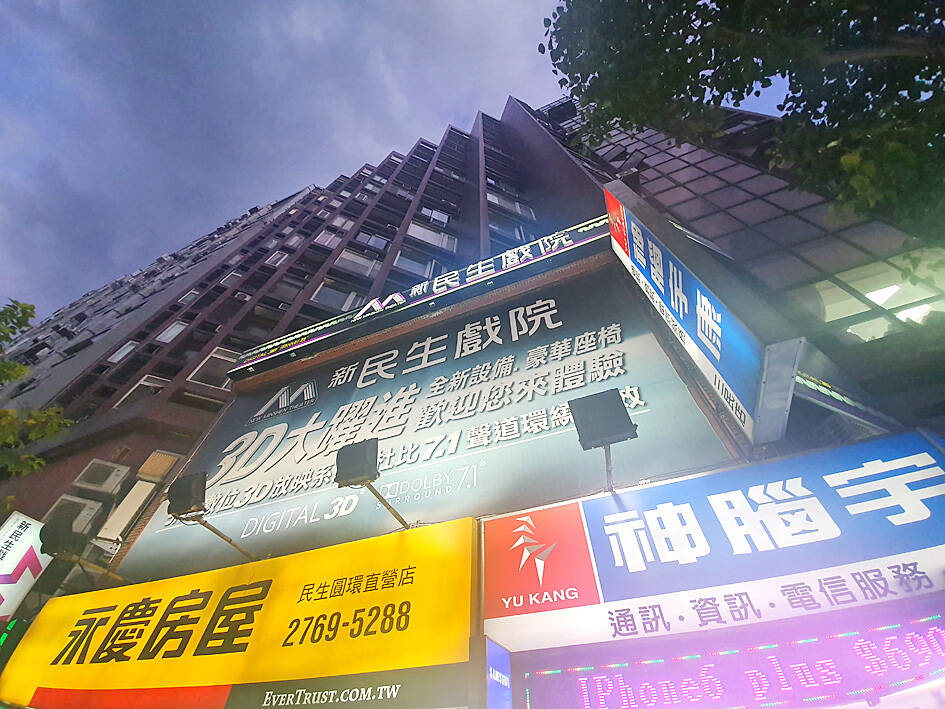Community movie theater Star Cinema (新民生戲院) and adjoining storefronts are to be auctioned off next month with a floor price of nearly NT$200 million (US$6.52 million), as their property owner, Shin Kong Life Insurance Co (新光人壽), seeks to revitalize old assets, bid organizer Colliers International Taiwan (高力國際) said yesterday.
The complex in Taipei’s Songshan District (松山) has a floor space of 397 ping (1,312m2), with the floor price likely being set at NT$480,000 per ping, implying an asking price of NT$190.56 million overall.
Community movie theaters are losing market share to movie theater chains such as Vieshow Cinemas (威秀影城) and Showtime Cinemas (秀泰影城), but some manage to survive, thanks to strong customer loyalty and convenient locations, Colliers Taiwan managing director Andrew Liu (劉學龍) said.

Photo: Lin Chia-yu, Taipei Times
Liu cited the examples of Blossom Cinema (梅花戲院), Broadway Cinema (百老匯影城), Halar Cinema (哈拉影城) and Governor Cinema (總督影城), almost all of which have been renovated or upgraded to stay competitive.
RENTAL INCOME
Colliers Taiwan said it has received inquiries partly because Star Cinema sits next to storefronts that generate stable rental income and pose potential urban renewal benefits.
The complex comes with seven basement parking spaces and might join movie theater chains, it added.
Another broker, Global Living Co (全球居不動產), raised doubt over the asking price, saying the complex is more than 40 years old.
While the residential spaces in the building’s upper floors might sell for more than NT$1 million per ping, the commercial spaces on the lower floors are not as attractive due to their poor lighting, Global Living said.
Rent returns could hover at about 2 percent based on the asking price, Global Living said.

Among the rows of vibrators, rubber torsos and leather harnesses at a Chinese sex toys exhibition in Shanghai this weekend, the beginnings of an artificial intelligence (AI)-driven shift in the industry quietly pulsed. China manufactures about 70 percent of the world’s sex toys, most of it the “hardware” on display at the fair — whether that be technicolor tentacled dildos or hyper-realistic personalized silicone dolls. Yet smart toys have been rising in popularity for some time. Many major European and US brands already offer tech-enhanced products that can enable long-distance love, monitor well-being and even bring people one step closer to

Malaysia’s leader yesterday announced plans to build a massive semiconductor design park, aiming to boost the Southeast Asian nation’s role in the global chip industry. A prominent player in the semiconductor industry for decades, Malaysia accounts for an estimated 13 percent of global back-end manufacturing, according to German tech giant Bosch. Now it wants to go beyond production and emerge as a chip design powerhouse too, Malaysian Prime Minister Anwar Ibrahim said. “I am pleased to announce the largest IC (integrated circuit) Design Park in Southeast Asia, that will house world-class anchor tenants and collaborate with global companies such as Arm [Holdings PLC],”

TRANSFORMATION: Taiwan is now home to the largest Google hardware research and development center outside of the US, thanks to the nation’s economic policies President Tsai Ing-wen (蔡英文) yesterday attended an event marking the opening of Google’s second hardware research and development (R&D) office in Taiwan, which was held at New Taipei City’s Banciao District (板橋). This signals Taiwan’s transformation into the world’s largest Google hardware research and development center outside of the US, validating the nation’s economic policy in the past eight years, she said. The “five plus two” innovative industries policy, “six core strategic industries” initiative and infrastructure projects have grown the national industry and established resilient supply chains that withstood the COVID-19 pandemic, Tsai said. Taiwan has improved investment conditions of the domestic economy

Sales in the retail, and food and beverage sectors last month continued to rise, increasing 0.7 percent and 13.6 percent respectively from a year earlier, setting record highs for the month of March, the Ministry of Economic Affairs said yesterday. Sales in the wholesale sector also grew last month by 4.6 annually, mainly due to the business opportunities for emerging applications related to artificial intelligence (AI) and high-performance computing technologies, the ministry said in a report. The ministry forecast that retail, and food and beverage sales this month would retain their growth momentum as the former would benefit from Tomb Sweeping Day